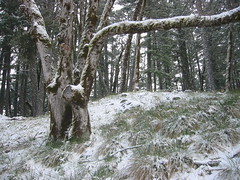
I was struck by the beauty and simplicity I encountered at the farm. It is pretty isolated (we traveled six miles off the highway on a bumpy dirt road that becomes impassable in the winter), and off the electrical grid. They get their power from the sun and their water from the creek that runs through the property. They have goats, chickens, dogs, and some new ducklings.
It was clear that Francis' philosophies about life are deeply ingrained in the way the farm is run. Instead of working against nature, as our industrial world tends to do, it works with nature, in harmony as part of nature.
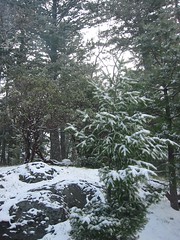

That line we usually place between people and nature is blurred. The intentions of the farm are pure -- it's not about making money, it's about sustainability.
Life on the farm was certainly different from everyday life in San Francisco. It involved a lot of cooking, eating, and chopping wood for the stove that kept us warm in the snowy weather.
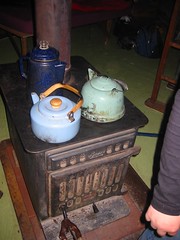

There was no feeling of rushing from one task to the next, another reflection of Francis. When he spoke to us there would often be long pauses, which would normally feel awkward, but didn't. I managed, for the most part, to ignore the homework I brought with me, and I enjoyed some wonderful conversations with my classmates.
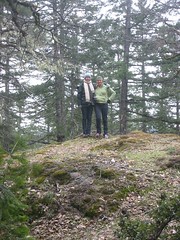
Simple living was a core value of the program I did in El Salvador, and it is a core value of the Jesuit Volunteer Corps, which I will be a part of next year. What does it mean to live simply in a world of consumerism and satisfaction based on material wealth and goods? Some people, like Francis, withdraw from that society and culture and live their own way. For some, that life might be perfect, but I wouldn't want the isolation that accompanies it.
I see two facets of simple living: rejecting materialism and simplifying one's daily life. How do you find a balance between doing all the things you want to do (education, service, activism, spending time with friends and family) and taking a step back, allowing yourself time? I wouldn't consider most of my activities a waste of time, so what could I cut out to allow myself the time to watch the sun set for two hours, as Francis mentioned doing? It's not an easy task, nor is living in harmony with nature when you're in a city and part of American culture, but if we're conscious of our actions, we can do better. I read a book last semester called Affluenza, which describes the all-too-common cycle of working hard, being unhappy at your job, buying material goods to make you happy, working even harder to pay for those things, buying more things to be happy, and so on. That is the lifestyle to avoid, and there's no reason we can't avoid it. Maybe all it takes is a trip to a farm.
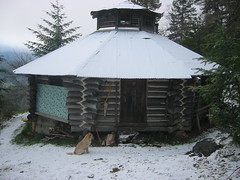
"Live simply, so that all may simply live." - St. Elizabeth Ann Seton
1 comment:
Nicely put. I haven't been to the farm because I am a sissy; but also while retreating is a good experience (in whatever form happens to suit us) it is important to acknowledge that wholesale sustainability like this could not feed the planet. We cannot go back to before industrialisation -- & personally I don't want to! I like your point about the cycle of work/consumerism. That is the slave mode we must all try to avoid. Working for toys. Not worth it.
Post a Comment